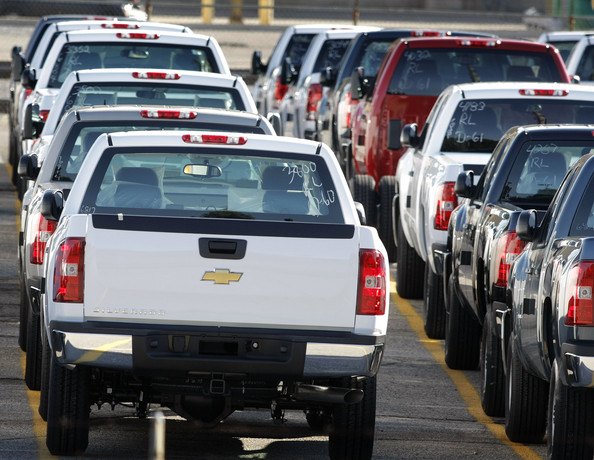General Motors, Channel Stuffing And The Return Of 2008
A lawsuit filed by a Florida investor against General Motors over the age-old practice of “channel stuffing”, or sending inventory to dealers and recording it as a “sale”, so that revenue numbers can be pumped up while the vehicles languish on dealer lots. The practice of channel stuffing is universal in the auto industry, but in this case, the consequences are much broader.
The specifics of the lawsuit, which hinge on specific phrases in the IPO prospectus, can be found here. The class action suit is unlikely to do any serious damage to GM, and will likely be the site of a long, protracted legal battle. The implications of channel stuffing are what really matter, and may provide a glimpse into both General Motors, and its government stewardship.
While General Motors is touting their 32 percent year-over-year increase in sales, a closer look at the numbers reveals a couple of things. According to Bloomberg, inventory for full-size trucks was at a 135 day supply, as GM ostensibly cranked out profitable pickups and sent them off to dealers across the land, allowing them to book sales of their most lucrative vehicles just in time for the half-way mark – and coincidentally (or not), government purchases of GM vehicles rose 79 percent in June. Retail sales were up a mere 8 percent, while fleet sales rose by 36 percent.
There is a political argument to be made for all of this, with GM’s financial health being integral to President Obama’s re-election, and a validation of the auto bailout and his economic policies. The Treasury still owns a 32 percent stake in GM, and selling their shares now would mean a major loss of taxpayer money. If GM’s fortunes were to reverse, than a quick exit, perhaps at a profit, might be possible.
The inflated inventories and “channel stuffing” aren’t just a manipulative way to make GM’s numbers look better than they are – they also expose GM to a potentially dangerous financial situation similar to 2008. General Motors, like any other car company, must sell the cars it builds. Its inventories are much higher than other manufacturers. Prior to the bailout, GM was caught out with large inventories of full-size trucks and SUVs at a time when a poor economy and rising gas prices made them unattractive to consumers. This same scenario occurring again isn’t inconceivable.
More by Derek Kreindler
Latest Car Reviews
Read moreLatest Product Reviews
Read moreRecent Comments
- ToolGuy I was challenged by Tim's incisive opinion, but thankfully Jeff's multiple vanilla truisms have set me straight. Or something. 😉
- ChristianWimmer The body kit modifications ruined it for me.
- ToolGuy "I have my stance -- I won't prejudice the commentariat by sharing it."• Like Tim, I have my opinion and it is perfect and above reproach (as long as I keep it to myself). I would hate to share it with the world and risk having someone critique it. LOL.
- SCE to AUX Sure, give them everything they want, and more. Let them decide how long they keep their jobs and their plant, until both go away.
- SCE to AUX Range only matters if you need more of it - just like towing capacity in trucks.I have a short-range EV and still manage to put 1000 miles/month on it, because the car is perfectly suited to my use case.There is no such thing as one-size-fits all with vehicles.


































Comments
Join the conversation
When the sh!t hits in Japan do you think thier government is going to let honda die? Would the Germans have let VW die in it's darkest days? The french? Hell even the british tried to save what was left, w/o understanding 100 years of relying on the colonial system had left its industry completely uncompetitive or repairable (my grandmother has pictures of shops in the 70's with signs saying "goods not made in england". Just as Carter having the balls to tell america that the results of WWII had allowed us to live in a dream land for 30+ years and was about to end and we better adjust and adjust quickly was derided, he was quite right (first USW, then the remainder of the rust belt and NE less the UAW and finally the UAW).
The Japanese government just recently bailed out and merged Sony, Toshiba, and Hitachi small and medium screen display manufacturers together and called it Japan Display. This is exactly what the South Korean government did for Hyundai and Kia when they were on the rocks a decade ago. All America's trading partners are state socialists at home and held up as pure capitalist heroes over here for political reasons. It's decadent so many Americans don't root for the home team and root for state socialist products from nations that we were at war with not that very long ago.